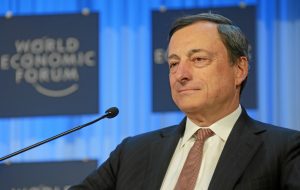Over the past several very turbulent years the European Union has faced many challenges, and they were directly related to its potential collapse. First Britain “shocked” the EU with their Brexit referendum (like when the road workers are “shocked and surprised by snow” in January), then followed the Yellow Vests protests, Matteo Salvini and the corona crisis. Now it is as though the clouds are slowly parting.

Copyright by World Economic Forum
swiss-image.ch/Photo Remy Steinegger
GOODBYE, UK!
The United Kingdom is now with both feet outside the Community, and they have their own issues to resolve now. Some things are going well (fast vaccination), some have a bumpy road ahead (the Irish Sea border), some are going badly (drop of GDP due to corona and the new taxes towards EU and other countries with which EUI has free trade agreements). Some will be excellent, as Johnson promised: new contracts with Australia, Canada, USA, Japan, etc. However, they will not be going back. At least not in whole. And will they ever allow Scotland to hold a new independence referendum which could potentially bring a new member to the gates of the EU, it is uncertain – definitely not before 2025 or later.
MACRON AGAIN AS MACRO
Emmanuel Macron was a lonely figure who advocated for European unity, strengthening of Europe’s role, for stabilization and consolidation of the Union before accepting new members (which placed WB6 and Ukraine, Moldova and Georgia in a new position during negotiations and accession), and the Yellow Vests threatened to shatter his throne. Things are not quite stable even today, but the strengthening of the EU and better relations with Russia and China, which Macron stands for, are increasingly more necessary at a time of crisis. Macron and Merkel together formulated a different form of multilateralism compared to the US even during Trump’s reign, and they intend to keep it during Biden’s rule as well. To Americans, multilateralism means “we, the West, against Russia and China”, but to France and Germany it’s “USA is there, EU is in the middle, Russia and China next to us as partners”.
UNCLE ARMIN AFTER MUTTI
The third thing that threatened the EU was the departure of “Mutti” – Angela Merkel, after 16 years of unprecedented stability and growth. Germany has defined the “American dream” in a European way. Germany became the “European dream”. It is an exemplary country that everybody wants to copy. A place with the best economy, the best integration, non-aggressive foreign policy and soft power: German football clubs and the German national team rule the world, just like the German merchandise, while “Babylon Berlin”, one of the few TV series with 100% rating on Rotten Tomatoes website, shows that Germany can make bestselling shows, along with bestselling cars. Angela Merkel was replaced by Armin Laschet and the world was relieved. According to “Die Standard”, his arrival to the head of CDU would not signify the turning of the backs to the Merkel era, because Laschet supported the Chancellor’s politics for years, and he especially took her side regarding the asylum policy. He advocates the continuation of her politics, the construction of Nord Stream-2, dialogue with Russia and China, and unlike his opponents, he is not an advocate for greater conservatism and turning towards the United States. During the “corona crisis”, however, there were differences, as Merkel was all for austerity, while Lachet asked for concessions. It seems that a man who will continue the “semi-social-democratic” politics of his predecessor is ready to lead Germany, to maintain European unity, and to turn the EU a force “for itself”. Stock markets and the people are at ease.
DRAGHI IS DEAR TO EUROPE, LIKE IN CROATIAN LANGUAGE!
But then came another sign of settling down. Mario Draghi became the new Prime Minister of Italy. With Draghi’s arrival, Italy is becoming a European pillar in the increasingly boiling Mediterranean Sea. Italy, on the other hand, needed a personality who would guarantee efficient, transparent and timely use of EUR 200 billion from the European fund. The initial reactions at the EU headquarters and of the European Central Bank after Draghi was given the mandate to assemble the Government, were the sighs of relief because the Recovery Fund was safe. “Super Mario” thus returned the old “European tripod” from the age of EEC, when these three countries (it was Western Germany back then) were the architects of the EU project, back in the game.
EPILOGUE
The Berlin – Paris axis was weak because the difference between the De Gaulle-oriented reformer Macron and the traditionally German-like cautious Merkel was at times too great for anything to be initiated. With the third leg, Italy, and Draghi, who is “dragi” (“dear” in Croatian) to the EU, Europe has a number it can be reached at and it has the stability. And if the fourth leg, the increasingly more agile Spain – which is currently surpassing Italy in wealth, and which is Euro-enthusiastic and enormous, joins them, the stability will be certain.
Text: Žikica Milošević